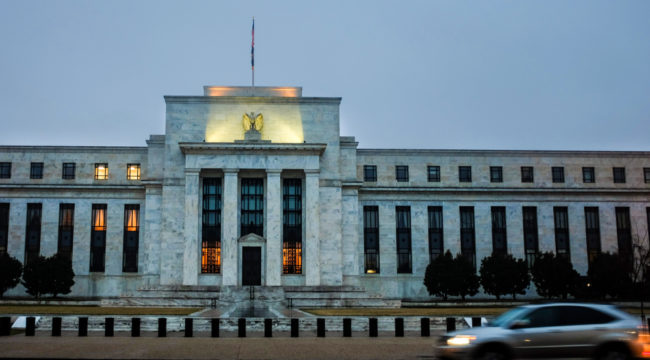The Fed Has Robbed the Future
by Brian Maher, Daily Reckoning:
 Has the future finally arrived?
Has the future finally arrived?
The Federal Reserve intervened massively to cage the menace of depression after the 2008 financial crisis.
Quantitative easing, zero interest rates and the rest of the central banker’s emergency kit came to bear.
The heroics “worked.”
The crisis has passed. And the economy is presently in its 108th month of recovery.
Yes, the central bank may have saved the present with its emergency medicine.
But it may have robbed the future along the way…
Interest rates would have likely soared following the financial crisis.
Many businesses dependent on cheap debt and low interest rates would have died the death.
But the pain — though acute — would have likely been brief.
Sound business would have survived.
Higher interest rates would have encouraged savings… and gradually rebuilt the capital stock.
From this capital stock the green shoots of future growth would have come thrusting.
But it wasn’t to be.
Rather than letting the fire clear the underbrush… the Federal Reserve intervened to save the deadwood.
The Bank for International Settlements estimates that 10% of current American corporations are “zombies.”
That is, they could not endure without ultra-low interest rates and cheap financing.
How many future redwoods never came into being because these zombies robbed their nutrients?
Debt-based consumption and artificially low interest rates rob the future to gratify the present.
They bring tomorrow’s consumption ahead to today, that is.
And they rob the saplings that promise tomorrow’s growth.
Daily Reckoning contributor Charles Hugh Smith:
Debt has one primary dynamic: Borrowing money to consume something in the present brings forward consumption and income…
If we choose to consume now, we have less income to save for future consumption or investments. If we sacrifice consumption today, we have more money in the future for consumption or investing…
Those who brought their consumption forward can no longer add to present consumption, as their future income is already spoken for.
Despite the Fed’s lovely fling at the printing press, GDP has only grown an average 2.16% since 2010.
Meantime, Bloomberg informs us that labor productivity has averaged a mere 0.7% annual growth since 2011.
In contrast, labor productivity worked out an average 2.6% gain from 2000 to 2007.
And from World War II to the end of the 20th century… 3.2%.
Read More @ DailyReckoning.com



